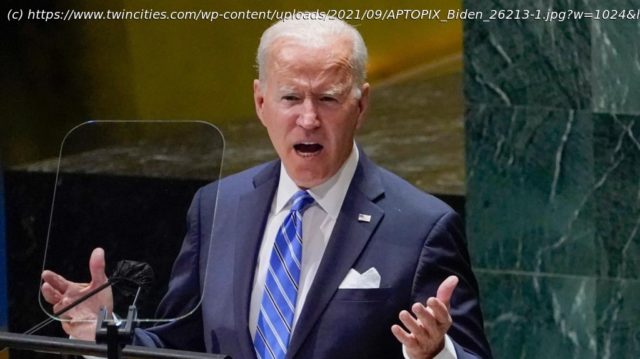UNITED NATIONS (AP) — President Joe Biden summoned the world’s nations to forcefully address the festering global issues of the COVID-19 pandemic, climate change and human rights abuses…
By JOSH BOAK and AAMER MADHANI UNITED NATIONS (AP) — President Joe Biden summoned the world’s nations to forcefully address the festering global issues of the COVID-19 pandemic, climate change and human rights abuses in his first address before the U.N. General Assembly on Tuesday. He decried military conflict and insisted the U.S. is not seeking “a new Cold War” with China. But while stressing to fellow world leaders the urgency of working together, Biden avoided addressing criticism from allies about the chaotic U.S. withdrawal from Afghanistan and a diplomatic tempest with France. Instead, Biden used his address before the annual gathering of world leaders to make his case that the United States remains a reliable international partner following four years of President Donald Trump’s “America first” foreign policy. “We’re opening a new era of relentless diplomacy, of using the power of our development aid to invest in new ways of lifting people up around the world,” Biden said. The president offered an impassioned plea for cooperation, to friends and adversaries, arguing that overcoming a daunting list of crises “will hinge on our ability to recognize our common humanity.” Biden said the U.S., under his watch, had reached a turning point with the end of military operations in Afghanistan last month, closing out America’s longest war. That set the table, he said, for his administration to shift its attention to intensive diplomacy at a moment with no shortage of crises facing the globe. “Today, many of our greatest concerns cannot be solved or even addressed by the force of arms,” he said. “Bombs and bullets cannot defend against COVID-19 or its future variants.” Biden offered a robust endorsement of the U.N.’s relevance and ambition at a difficult time in history, and sought to reassure wary allies of U.S. cooperation. He pledged to double U.S. financial aid to poorer countries to help them switch to cleaner energy and cope with the “merciless” effects of climate change. That would mean increasing assistance to about $11.4 billion a year — after five months ago doubling the amount to $5.






